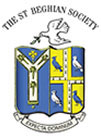|
 |
The Old St Beghian | |
| January 2015 | |||
John Wilkin (SH 55-60) recalls choirs and choirmasters:
“ ‘Am I going to be good enough?’ ‘What's the conductor like?’ ‘Will rehearsals be interesting?’ These are the sort of questions you think about when joining a new choir, as my wife and I have done many times.
Despite a childhood in Huddersfield surrounded by ‘Messiahs’, the first choir I joined was at St Bees in 1955, where I moved from treble through alto to bass.
The choirmaster, Donald Leggat, drove a Triumph TR2 and a Bedford Dormobile, and hosted a weekly popular classics show on the Home Service, but in between he taught us how to sing. The first anthem I learned was Charles Wood's O Thou the Central Orb and other memorable pieces were Stanford's The Blue Bird and Allegri's Miserere, not often heard in Whitehaven! We learned some good choral habits, like putting up your hand if you know you've boobed in rehearsal.
At university the first fellow student I met was the late Christopher Hogwood, who had the next room to me, but I never heard him sing. I was lucky to sing in a small group led by David Munroe, another student who went on to make a career in music, although he died in 1976. Britten's Five Flower Songs remains in my memories of that time.
Then to London, where I joined Hampstead Choral Society, conducted by a perfectionist called Martindale Sidwell. We hired the Festival Hall and a London Orchestra for one concert a year, which used to worry the treasurer, and we sang Bach's B Minor Mass and Beethoven's Missa Solemnis in the two years I was there. Both of these were broadcast.
After that, frequent changes of employment resulted in brief periods with, among others, Salford City Male Voice Choir (Just a Song at Twilight in the Methodist Church at Irlam o' the Heights); Watford Philharmonic Chorus; and Sale and District Musical Society, where we gained third place in a class at Buxton Festival (there were only three entries that year - the test piece was Vaughan Williams's Valiant for Truth). I also remember one conductor who complained that he couldn't keep up with us. I failed the audition for the Halle Choir (what a fine chorus that is!) where I had to sing "The Trumpet Shall Sound" on a platform in front of the whole committee. I think my trumpet was a bit strangled.
Married by then, my wife and I moved to Newcastle upon Tyne in 1971 where we joined the Newcastle Bach Choir, based in the university and conducted for one term by Denis Matthews, best known as a pianist, and then by Percy Lovell. We found this a bit heavy going - the mid-practice break was taken up by the roll call - and so we moved to the Newcastle City Chorus, which was funded by the local authority and sang with visiting orchestras and conductors in the City Hall. We also sang a couple of times in the Philharmonic Hall in Liverpool - Britten's War Requiem with a young Andrew Davis and Elgar's Dream of Gerontius with Charles Groves.And so it continued and my wife and I now sing with the Bury St Edmunds Bach Choir. I’ve clocked up nearly sixty years in various choruses with rehearsals for two hours a week and forty weeks a year adding up to 4800 hours, plus concerts. What have I learned? Firstly, never sing the final "s" of a word as it's sure to be in the wrong place; secondly, conductors are taught to threaten to resign twice a term, but never do it; and finally, one hundred people meeting together every week to be told what to do sounds like madness and probably is, but isn't it good fun? I’m very grateful to Donald Leggat for setting me on this path.”
Home
The St Beghian Society
St Bees School,
St Bees, Cumbria, CA27 0DS.
Tel: (01946) 828093 Email: osb@stbeesschool.co.uk
Web: www.st-beghian-society.co.uk